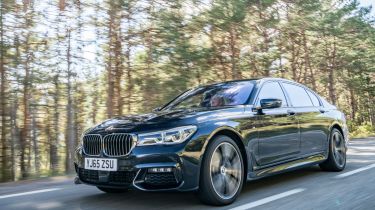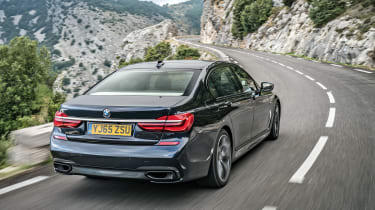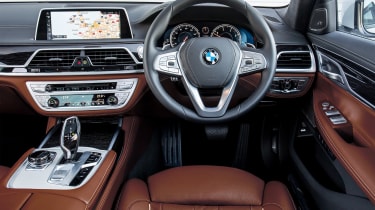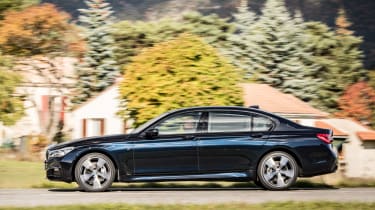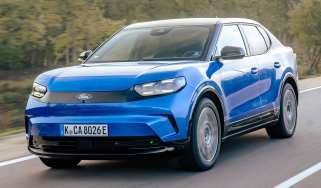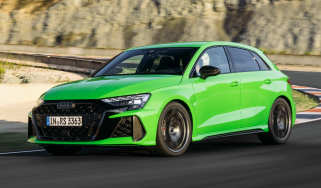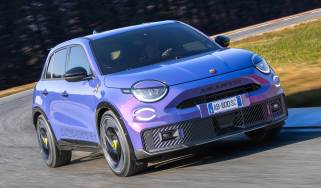BMW 740Ld xDrive 2016 review
Four-wheel-drive BMW 740Ld has the performance, but it comes at a cost
It’s a shame you have to spec four-wheel drive on this superb 740d. The engine is pure class, and makes the big limousine accelerate like a sports car. However, for most British buyers, the extra cost will outweigh any advantage of all-wheel drive. The lesser-powered but still excellent 730d remains our top pick, then, with almost as much get up and go, but for thousands less.
The BMW 7 Series has long sat in the shadow of Mercedes’ all-conquering S-Class. It was never quite as stylish, never quite as desirable, never quite as luxurious. But a new 7 arrived last year, and finally gave the big Benz something to worry about.
We praised it for its beautifully crafted cabin and space-age technology, as well as its first-class refinement and powerful diesel engines. But that wasn’t all: the new BMW 7 Series is not only cheaper to buy than the equivalent S-Class; crucially, it’s cheaper to run, too.
• Best executive cars on the market
However, this is the first time we’ve been given the chance to try BMW’s flagship saloon with the brand’s more powerful diesel engine. It’s available to order now – exclusively with xDrive all-wheel drive – and comes with all the same kit as the non-4x4 version, including sat-nav, wireless charging and a WiFi hotspot.
BMW has cleverly backed its buyers into a corner, though. You can buy a less potent 730d with or without all-wheel drive, but you can only buy a 730d xDrive with the standard wheelbase. The 740d, however, is available with a long or short wheelbase, but only with xDrive for the time being.
More reviews
Car group tests
In-depth reviews
Road tests
- New BMW 760i 2022 review
- New BMW 7 Series prototype review
- New BMW 745Le xDrive plug-in hybrid 2019 review
- New BMW 7 Series facelift 2019 review
Used car tests
So, if you want xDrive but insist on the longer car, then you’ll need this 740Ld. Yet if you want all-wheel drive and not the more powerful engine, you’ll be forced into the shorter model.
You can however, specify xDrive on both the standard-wheelbase 730d and the 740d – and it’s the more powerful car we tried here, albeit in long-wheelbase form. Confused? It’s not surprising.
The extra grip is what this car is all about. It holds the road like little else, and despite its size, can be flung round a corner – no matter what the weather’s doing – at surprising speeds. It’s a big limousine, but has the accuracy and agility of something half its size.
Standard-fit air-suspension works wonders, too. There’s a discernable difference between the Sport setting and the normal Comfort mode, so you can waft on longer journeys and tighten things up when things get twistier.
The steering has the same two settings, but the 7 Series is a bit short on feel through the wheel. While Comfort mode is perfect for motorway jaunts, as we drove up through the mountains around Geneva we were left wanting more. It’s a shame on a car with this much grip, and as a result, the 740Ld xDrive ends up surprising you as it darts round bends hugging the kerb like a rear-drive sports car.
Still, for 10 months of the year, most UK buyers will never need the all-wheel-drive system. While it’s hard to compare prices like-for-like, looking further down the range at the 730d suggests you pay around £2,700 for the privilege of two added driven wheels. And we think you’d be better spending that money on BMW’s brilliant laser lights, or a full-length panoramic sunroof and some extra toys.
In fact, while the 740Ld’s superior power and torque are a welcome addition, the 730d more than serves its purpose and feels suitably rapid in-gear – especially from 50-70mph. The added 55bhp and 60Nm of torque in the more powerful car shave six tenths of a second off the 0-62mph sprint time (730d vs 740d), but both will sit happily at 155mph if you regularly commute via German autobahn.
Fuel economy understandably takes a small hit, too. The 7 Series is still remarkably efficient for such a gigantic limousine, though, with even this 316bhp, long-wheelbase 4x4 model claiming a staggering 52.3mpg and just 139g/km of CO2. It’s more efficient, in fact, than the 430d Gran Coupe – thanks to the 7 Series’ carbon core structure. An Audi A8 3.0 TDI quattro averages a comparatively poor 47.9mpg and is over half a second slower from 0-62mph.
Interior quality remains top notch, too, and whether you like to drive or be driven, the 7 Series is simply exquisite inside. It’s remarkably refined and the seats are comfortable and supportive both front and rear. The dash is familiar, if a little cluttered, though, still losing out to the S-Class with its classy but intuitive layout.

